“Dark Waters” (2019). Cast: Mark Ruffalo, Anne Hathaway, Tim Robbins, Bill Camp, Bill Pullman, Mare Winningham, Victor Garber, Louisa Krause, William Jackson Harper, Richard Hagerman, Denise Dal Vera, Scarlett Hicks, Bella Falcone, Jim Azelvandre, Kevin Crowley, Jeffrey Grover, Kelly Mengelkoch, Annie Fitzpatrick, John Newberg. Director: Todd Haynes. Screenplay: Matthew Michael Carnahan and Mario Correa. Story: Nathaniel Rich, “The Lawyer Who Became DuPont’s Worst Nightmare,” The New York Times Magazine, 2016. Web site. Trailer.
At some point in our lives, many of us come face to face with situations where we need to make difficult choices and engage in challenging tasks, simply because they’re the right thing to do. Such efforts may test us severely, pushing us to the brink of – and possibly beyond – what we think we’re capable of. Those can be hard times, for sure, but, when we consider what’s at stake – and what we can gain by willingly choosing to act – we’re likely to see that we must do what we do if we’re to live with ourselves. So it is for a beleaguered protagonist in the new fact-based legal thriller, “Dark Waters.”
Attorney Rob Bilott (Mark Ruffalo) enjoys a comfortable and successful life as a corporate attorney in Cincinnati. He’s made a good career for himself representing companies in the chemical industry, most notably DuPont, one of his firm’s most important clients. In fact, his legal defense work for that organization contributed significantly to him making partner and becoming one of the most trusted advisors to managing partner Tom Terp (Tim Robbins). And, outside of work, Rob is happily married to his wife, Sarah (Anne Hathaway), who gave up her career as a lawyer to become a stay-at-home mother of three. It seems like everything is going his way – that is, until someone walks into his office one day and changes his life forever.
[caption id="attachment_11178" align="aligncenter" width="350"]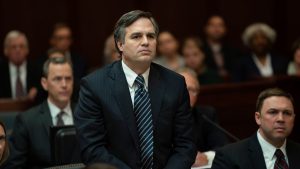 Intrepid attorney Rob Bilott (Mark Ruffalo, center) does an about-face by suing the chemical company giant he once represented in director Todd Haynes’s fact-based legal thriller, “Dark Waters.” Photo by Mary Cybulski, courtesy of Focus Features.[/caption]
Intrepid attorney Rob Bilott (Mark Ruffalo, center) does an about-face by suing the chemical company giant he once represented in director Todd Haynes’s fact-based legal thriller, “Dark Waters.” Photo by Mary Cybulski, courtesy of Focus Features.[/caption]
While conferring with his fellow partners, Rob is called out of the meeting when he’s asked for by name by someone he’s never met, West Virginia farmer Wilbur Tennant (Bill Camp). Utterly perplexed, Rob asks Wilbur why he specifically wants to see him, to which the stranger replies that he was recommended by one of Rob’s relatives from back home in Parkersburg, WV, where the attorney spent many of his summers while growing up. When Rob then inquires about the nature of Wilbur’s legal needs, the farmer tells him that contaminants had seeped onto his property and poisoned the drinking water source for his herd of cows, killing 190 of them. Wilbur then points the finger at the culprit he believes is behind this problem – the DuPont organization.
Rob tells Wilbur that, since he represents DuPont, it’s unlikely he’ll be able to help him. But something about Wilbur’s story troubles him, so Rob drives to Parkersburg to investigate further. Upon witnessing the harm inflicted on Wilbur’s farm, he feels compelled to see if there is any way he can help. And so, upon returning to Cincinnati, he consults with his peers to discuss an equitable way to work out the situation between Wilbur and DuPont. Rob approaches DuPont executive Phil Donnelly (Victor Garber) to propose negotiating a settlement arrangement, and the company initially agrees to cooperate. But, before long, matters take a left turn, and the deal is off.
As Rob begins to discover more of what’s really going on in Parkersburg, he sees a bigger problem than just the deaths of Wilbur’s cows. He wants to help those who have been hurt, but he’s also got his obligations to his firm and to DuPont as a client. But, after an anxious discussion with Tom, he persuades the managing partner to back him in his plan to take on the chemical company giant, despite the stakes involved.
[caption id="attachment_11179" align="aligncenter" width="350"]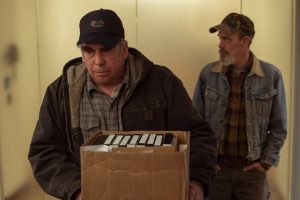 West Virginia farmer Wilbur Tennant (Bill Camp, left) seeks to sue chemical giant DuPont after losing 190 cows to contaminated drinking water as seen in the new fact-based drama, “Dark Waters.” Photo by Mary Cybulski, courtesy of Focus Features.[/caption]
West Virginia farmer Wilbur Tennant (Bill Camp, left) seeks to sue chemical giant DuPont after losing 190 cows to contaminated drinking water as seen in the new fact-based drama, “Dark Waters.” Photo by Mary Cybulski, courtesy of Focus Features.[/caption]
Challenging one of the country’s largest and most beloved companies quickly proves to be a much bigger undertaking than anticipated. Rob becomes buried in piles of discovery materials submitted in hopes that the sheer volume will discourage him in his quest. But he’s not the only one who is taken to task; Wilbur comes under fire, too, as Parkersburg residents shun the man who has decided to threaten the community’s largest employer and the livelihood of its many workers, most of whom would be lost without their jobs at DuPont. Despite those obstacles, though, Rob meticulously reviews the discovery materials, and Wilbur sticks to his guns to proceed, public reaction notwithstanding.
Circumstances quickly escalate for all concerned. The long hours involved in reviewing the discovery materials take a toll on Rob’s physical and emotional well-being, as well as the health of his marriage. But, when Rob meets with a chemical expert (John Newberg) and learns what’s behind the pollution, he’s shocked. He discovers that the drinking water has been contaminated with “forever chemicals” – those that don’t break down in the body and accumulate over time – to such an extent that much of the Parkersburg community – and users of products containing these chemicals outside of the area – could well be affected.
The greatest concern involves a substance known as PFOA-C8, a chemical that goes into making Teflon. The chemical was originally developed to help protect the exteriors of army tanks but was later adapted for consumer product use, most notably in manufacturing nonstick cooking pans. As Rob learns through his discovery review, DuPont’s own studies revealed that the chemical caused cancer in animals and humans and birth defects in the unborn children of women working at the company’s facilities. This discovery led to ongoing monitoring programs on animals and the organization’s employees – and was implemented without saying a word about the danger. With huge volumes of toxic sludge containing the chemical dumped up river from Wilbur’s farm, it’s not hard to see how his cows became sick – or how Wilbur and his wife, Sandra (Denise Dal Vera), subsequently followed suit.
To make matters worse, PFOA is an unregulated substance, one for which there is no government oversight, including the determination of environmental safety levels, thereby muddying the waters about adequate protection and potential liability. How much is too much? Who makes the determination? What constitutes a violation? And what are the penalties for noncompliance?
[caption id="attachment_11180" align="aligncenter" width="350"]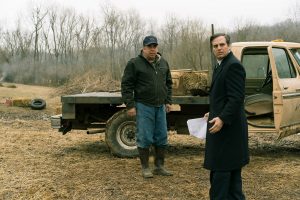 On his farm outside Parkersburg, WV, farmer Wilbur Tennant (Bill Camp, left) shows attorney Rob Bilott (Mark Ruffalo, right) the extent of the damage done to his property and livestock in “Dark Waters.” Photo by Mary Cybulski, courtesy of Focus Features.[/caption]
On his farm outside Parkersburg, WV, farmer Wilbur Tennant (Bill Camp, left) shows attorney Rob Bilott (Mark Ruffalo, right) the extent of the damage done to his property and livestock in “Dark Waters.” Photo by Mary Cybulski, courtesy of Focus Features.[/caption]
Thus begins a protracted legal battle. DuPont offers to settle with Wilbur, a proposal Rob encourages him to accept, but he refuses, contending that he wants justice more than money. In the wake of this, Rob submits a brief to the Environmental Protection Agency and the Department of Justice that incorporates DuPont’s internal information found during discovery, a move that leads to a sizable fine from the EPA.
However, despite this result, Rob is not satisfied, given that Parkersburg residents will be affected by this problem for the rest of their lives. He subsequently prepares a class action lawsuit when Parkersburg resident Darlene Kiger (Mare Winningham) and her second husband, Joe (Richard Hagerman), come forward with a letter they received from their local water district warning them of the presence of PFOA in their drinking water. Upon receiving this notification, Darlene recalls that her first husband, a DuPont chemist, cautioned her about the dangers of handling his work clothes in light of possible PFOA contamination and the health implications for women and unborn children. Even with taking this precaution, Darlene still needed to undergo an emergency hysterectomy several years later.
This revelation leads to a community-wide medical monitoring program to determine how many Parkersburg residents are affected. The seven-year study, which ends up testing 70,000 people, tries the patience of all concerned, as well as Rob’s own physical health. But, when the results come in, the door to justice opens at last.
Stories like this outrage most of those who hear about them. One wonders how any individual or organization, in all good conscience, could allow circumstances like this to go on for as long as they did. It raises serious questions about priorities. But, to understand the answers to those questions, one needs to look at the underlying beliefs driving them, for they determine the outcome that emerges through the conscious creation process, the philosophy that maintains we harness these powers in manifesting the reality we experience.
In a scenario like this, where profits are placed before people, it’s not difficult to see what beliefs are at work. This is a prime example of the practice of un-conscious creation, where achieving a particular outcome is viewed as paramount, regardless of whatever consequences may accompany it. Even in the most benign of circumstances, this can be a problematic course to follow, for there may be all manner of unintended side effects and fallout. In a situation like this, where the company knowingly engages in this sort of behavior, it’s difficult to believe that it couldn’t envisage the negative consequences, especially after its own studies found them to be occurring. This suggests that the power of the overriding beliefs is so strong that it’s like an unstoppable juggernaut, collateral fallout aside. Of course, when this occurs, there’s usually hell to pay eventually, as DuPont finds out when it’s hauled into court, undoubtedly another side effect that likely was not part of the original intent.
[caption id="attachment_11181" align="aligncenter" width="350"]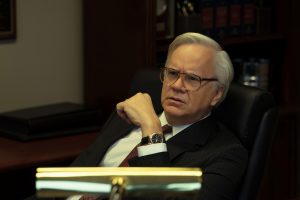 Tom Terp (Tim Robbins), managing partner of a Cincinnati-based corporate law firm that specializes in defending chemical companies, struggles with what to do when one of his organization’s partners wants to sue one of its biggest clients in director Todd Haynes’s “Dark Waters.” Photo by Mary Cybulski, courtesy of Focus Features.[/caption]
Tom Terp (Tim Robbins), managing partner of a Cincinnati-based corporate law firm that specializes in defending chemical companies, struggles with what to do when one of his organization’s partners wants to sue one of its biggest clients in director Todd Haynes’s “Dark Waters.” Photo by Mary Cybulski, courtesy of Focus Features.[/caption]
As noble and high-minded as taking on a cause like this might seem, doing so may prove more challenging than anticipated given the power of the beliefs employed by the opposing party. This means that the crusader pursuing such a quest must be equally firm in his, her or its beliefs to counter the opposition. And this usually requires having one’s metaphysical ducks in a row to pull that off.
Fortunately, Rob had those elements in place in his efforts. For example, his beliefs were rooted in integrity, a keen awareness that he was doing the right thing. This becomes especially apparent in a scene that has nothing to do with a courtroom or law office; it’s a late night at the Bilott home when he’s noisily and frenetically rummaging through the kitchen pots and pans, a clamor that awakens his pregnant wife and prompts her to think her stressed-out husband has lost it. However, when he calms down and earnestly explains the staggering ramifications behind what PFOA can do when it makes its way into the home and into one’s bloodstream – especially that of an expectant mother – the sincerity behind his beliefs becomes all too clear. And, when he applies the same level of conviction to his legal efforts that he does in explaining the situation to Sarah, the strength of those beliefs is obvious – and equal to those being put forth by the other side.
In addition to the integrity underpinning his beliefs, Rob approaches his work with unbridled fearlessness, a heroic courage that drives him to keep moving forward despite the potential consequences that could befall him and his law firm. In taking on Wilbur’s case (and, eventually, that of all Parkersburg residents), he runs the risk of losing a lot – his career, his financial well-being, his health and his marriage, to name just a few items. He also faces the possibility of losing credibility and being labeled a hypocrite, given that, prior to the West Virginia cases, he made a rather comfortable living advising chemical companies how they could pollute the environment without breaking the law. But, considering what he sees has happened, is happening and will likely continue to happen if not challenged, he knows someone has to step up to the plate and take on the forces behind these incidents, no matter how imposing they may seem and how much clout the perpetrators may have with a conciliatory government, their faithful customers and their loyal employees.
When all is said and done, Rob comes to know that this is the path he must follow. No matter what hardships, trials and tribulations might come his way, he realizes that taking on this challenge is his destiny, what conscious creators call value fulfillment, the practice of being our best, truest selves for the betterment of ourselves and those around us. And, because of this, he arms himself with the beliefs needed to make his cause work. And that is true conscious creation at work.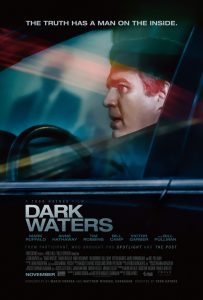
“Dark Waters” is one of the most important films to come along in quite some time, not only for the heroic example it sets both practically and metaphysically speaking, but also because of the cause it champions – that of individuals taking back their personal power. It’s unfortunate that it hasn’t received more attention than it has, given that it truly deserves it. Despite some occasional tendencies toward being formulaic, director Todd Haynes’s new fact-based thriller explores the efforts of a determined community, led by a courageous and ethical attorney, to take on a major chemical corporation hiding the dangers of its products and the fallout that comes with it. The film’s excellent script does a fine job explaining the complex litigious questions involved, detailing the implications of the crusaders’ actions without resorting to jargon or unfathomable legalese, and in outlining the complicated science at the heart of the case. Then there are the superb performances of Ruffalo as the heroic lawyer and Camp as his outraged and victimized client. This is an important story, one that’s well told and doesn’t hold anything back, a tale that should inspire us all to action when it comes to tragedies such as this.
We’re indeed fortunate to have individuals like Rob Bilott in our midst. Were it not for his efforts, the residents of Parkersburg – and even the world beyond its borders – might not have had someone to champion their cause, one that carries implications far greater than what was originally imagined. Succeeding in tasks such as this may require wading into some very dark waters, a prospect many of us would be loath to face. But, thankfully, the beneficial outcomes of these ventures frequently prove worth it, aiding us all when the odds are seemingly stacked against us.
Copyright © 2019, by Brent Marchant. All rights reserved.
Tuesday, December 31, 2019
‘Dark Waters’ pushes us to test – and surpass – our limits
Friday, December 27, 2019
‘Marriage Story’ showcases what makes a relationship succeed – or fail
“Marriage Story” (2019). Cast: Scarlett Johansson, Adam Driver, Laura Dern, Alan Alda, Ray Liotta, Julie Hagerty, Merritt Wever, Wallace Shawn, Azhy Robertson, Martha Kelly, Mark O’Brien, Robert Smigel, Brook Bloom. Director: Noah Baumbach. Screenplay: Noah Baumbach. Web site. Trailer.
It’s sad when a relationship comes to an end, even when it’s the best thing for the partners involved. But matters can become that much worse when the parting becomes inflamed with heated rhetoric and venomous emotions, not only for those directly involved, but also for those touched by the fallout. Such is painful saga outlined in the gripping new family drama, “Marriage Story.”
From all outward appearances, Charlie and Nicole Barber (Adam Driver, Scarlett Johansson) have what seems to be a happy and fulfilling marriage. But, as quickly becomes apparent, looks can be deceiving. After years of simmering tensions between the two of them, the New York theater company director and his actress wife have agreed to divorce, a process they hope to implement with civility, cooperation and the best of intentions. They hope to make the transition as smoothly and seamlessly as possible for all concerned, especially their young son, Henry (Azhy Robertson).
However, those hopes are quickly dashed. Despite their agreement to work with a mediator (Robert Smigel) to cushion the separation process, those plans go out the window when Nicole reneges and refuses to cooperate. And, not long thereafter, matters are further derailed when Nicole accepts an offer for a television pilot, an opportunity that takes her to Los Angeles – with Henry in tow. Suddenly the Barbers have become bicoastal parents, with Henry caught between his increasingly contentious mom and dad.
[caption id="attachment_11169" align="aligncenter" width="350"]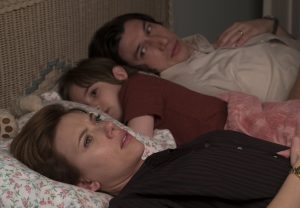 Divorcing parents Nicole Barber (Scarlett Johansson, left) and husband Charlie (Adam Driver, right) wrestle with custody issues involving their young son, Henry (Azhy Robertson, center), in director Noah Baumbach’s “Marriage Story.” Photo by Wilson Webb, courtesy of Netflix.[/caption]
Divorcing parents Nicole Barber (Scarlett Johansson, left) and husband Charlie (Adam Driver, right) wrestle with custody issues involving their young son, Henry (Azhy Robertson, center), in director Noah Baumbach’s “Marriage Story.” Photo by Wilson Webb, courtesy of Netflix.[/caption]
It isn’t until Nicole arrives in California that viewers begin to learn what’s really been going on between her and Charlie. During impassioned venting sessions with her mother, Sandra (Julie Hagerty), her sister, Cassie (Merritt Wever), and especially her newly hired divorce lawyer, Nora Fanshaw (Laura Dern), Nicole offloads what’s been bugging her. And she has a lot to say.
According to Nicole, Charlie perpetually put his vocational needs first, making her aspirations secondary, despite his willingness to feature her prominently in his theatrical productions. This, combined with the obligations of motherhood, left her feeling unfulfilled, dismissed and ignored (in a word, “smaller”). What’s more, as an Angelino by birth, she longed to explore career options in her hometown and not just those on the New York stage, something she claimed Charlie always downplayed or placed on the back burner. Oh, and, if that weren’t enough, she suspects he slept with his theater company’s stage manager.
Upon hearing all this, Nora convinces Nicole that she’s got quite a case, one ripe for a generous settlement. However, this news only serves to inflame an already-tense situation. When Charlie learns that Nicole has hired an attorney, he’s upset, given that they had originally agreed to work out their separation without lawyers becoming involved. What’s more, once Nicole’s TV pilot is picked up as a series, she decides to relocate to California permanently, a living arrangement that includes Henry. What started out as a hoped-for amicable parting has now begun to get ugly.
[caption id="attachment_11170" align="aligncenter" width="350"]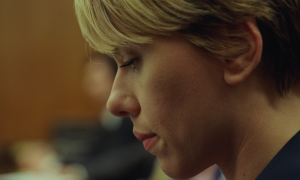 Nicole Barber (Scarlett Johansson) seeks a divorce from her husband Charlie, claiming that he’s placed her needs secondary to his, as seen in the gripping new drama, “Marriage Story.” Photo by Wilson Webb, courtesy of Netflix.[/caption]
Nicole Barber (Scarlett Johansson) seeks a divorce from her husband Charlie, claiming that he’s placed her needs secondary to his, as seen in the gripping new drama, “Marriage Story.” Photo by Wilson Webb, courtesy of Netflix.[/caption]
To protect his rights, Charlie amps up his game by looking to hire an attorney of his own, Jay Marotta (Ray Liotta), a hard-nosed, pricey counselor who is everything that he had hoped he could avoid. He soon discovers, though, that Jay is someone whom he neither can nor wants to afford, both financially and ethically. Yet, if he’s to preserve his child custody rights, he needs to find replacement counsel quickly, a requirement that urgently leads him to Bert Spitz (Alan Alda), a less expensive, more conciliatory family law attorney.
On Bert’s advice, to help secure his rights in the eyes of the court, Charlie rents an apartment in Los Angeles to demonstrate his desire to be close to his son. He begins dividing his time between the coasts, working on the launch of a new Broadway production while doing what he can to try and keep things civil in his divorce proceedings. Circumstances deteriorate further, though, when the legal bickering intensifies, with accusations and maneuverings that become downright vicious, sometimes to an utterly preposterous level. Even Jay returns to the fray when Charlie admits he needed to hire “an asshole of his own” to fight on his behalf. By this point, it’s hard to imagine that these two people ever loved one another – or that they’ll ever be able to reach a workable agreement, especially where Henry is concerned.
Many of us would naïvely like to believe that love is all it takes to make a relationship succeed. If only that were true. However, as anyone who has ever been involved with someone for the long term knows, it calls for more than just a romantic connection. It also takes a commitment to hammer out all of the details that go into building a partnership on multiple levels, all of which require a high degree of mutual agreement for them to work. And that may prove to be more challenging than being able to love someone else, no matter how much.
[caption id="attachment_11171" align="aligncenter" width="350"]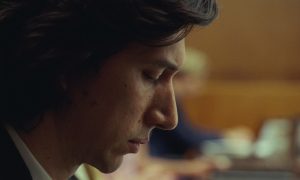 Charlie Barber (Adam Driver) struggles to hold on to his child custody rights in contentious divorce proceedings with his wife, Nicole, in director Noah Baumbach’s “Marriage Story,” now available for streaming on Netflix. Photo by Wilson Webb, courtesy of Netflix.[/caption]
Charlie Barber (Adam Driver) struggles to hold on to his child custody rights in contentious divorce proceedings with his wife, Nicole, in director Noah Baumbach’s “Marriage Story,” now available for streaming on Netflix. Photo by Wilson Webb, courtesy of Netflix.[/caption]
How all of those other elements come together depends on the beliefs held by each party, and that’s important to recognize, for those intentions lead to what a couple manifests. Such is the outcome of the conscious creation process, the philosophy that maintains we draw upon those metaphysical building blocks in materializing what we experience.
Given the challenges we can each experience in successfully formulating, defining and implementing our manifesting beliefs, it can be that much more difficult when having to get two individuals on the same page when it comes to this process. And, when seeking to build a life together, think about the myriad areas in which a couple needs to pursue belief agreement – living arrangements, finances, career aspirations, having children and hopes for the future, to name but just a few. Now, considering that many of us have trouble enough achieving satisfaction in any of those areas by ourselves, it’s truly quite an undertaking when partners seek to tackle them together. The fact that a couple is able to attain concurrence on any one of these various fronts – let alone all of them – is indeed amazing. Which is why it’s not entirely surprising that disagreements are going to occur along the way. And, if there are enough of them, it’s not too difficult to imagine discord springing up in the relationship. Should they reach a serious enough degree, the relationship can easily be thrown into jeopardy – which can lead a couple to where Charlie and Nicole are at.
This is not to suggest that such situations are irreparable. If both partners are aware of a problem, they can discuss the matter, preferably by deeply examining the beliefs that are the root cause of the disagreement. Through effective listening and a willingness to cooperate in finding a workable solution, it’s entirely possible for a couple to rewrite their beliefs to more amenable notions that address the issues at hand and give them both what they want. Everybody wins.
[caption id="attachment_11172" align="aligncenter" width="350"] Divorce lawyer Nora Fanshaw (Laura Dern, left) advises her client, Nicole Barber (Scarlett Johansson, right), about her rights in parting from husband Charlie in director Noah Baumbach’s latest offering, “Marriage Story.” Photo by Wilson Webb, courtesy of Netflix.[/caption]
Divorce lawyer Nora Fanshaw (Laura Dern, left) advises her client, Nicole Barber (Scarlett Johansson, right), about her rights in parting from husband Charlie in director Noah Baumbach’s latest offering, “Marriage Story.” Photo by Wilson Webb, courtesy of Netflix.[/caption]
However, when those considerations aren’t brought into play, it’s not unusual for circumstances to spin out of control. Those conditions, in turn, can lead to the formation of negative beliefs that each partner may begin to hold about the other – beliefs that don’t do much to nurture and support the viability of the relationship, such as resentment and spite. Once qualities like that enter into the mix, it becomes increasingly difficult to go back, even to recognize the love that birthed the partnership in the first place. With the well poisoned, it’s often downhill from there, especially if advocates for each partner become involved and turn up the volume of the arguments between them. And, again, you have Charlie and Nicole.
One of the points “Marriage Story” drives home quite effectively is how totally absurd some of these vindictiveness-driven beliefs can become. Divorcing partners and their attorneys can distort their impressions of one other all out of proportion, resulting in ludicrous, completely inaccurate, even laughable depictions of one another. This can be especially true when implemented to drive up the stakes of a settlement, a distinct act of un-conscious creation, where beliefs are put into place simply to achieve a particular outcome with no consideration for the consequences. The result can be far more devastating for all involved (and that can include more than just the divorcing partners, such as situations where children are involved).
The key to avoiding such outcomes – and perhaps to avoiding divorce in the first place – is to aspire to successful acts of co-creation. Through this practice, both partners seek to formulate, define and implement beliefs aimed at achieving mutually agreeable results, no matter what aspect of the relationship is being addressed. If employed as an overarching principle in the way the marriage works, there is a far greater likelihood of achieving harmony and long-term success. And, even if the relationship ultimately does not succeed, divorcing partners could at least attempt to employ co-creation as a means of coming up with a workable settlement, one that leads to separation on amicable terms, particularly where custody questions come into play. One can only hope that Charlie and Nicole will find it within themselves to come up with such a solution for themselves – if not for their own sake, then at least for Henry’s.
[caption id="attachment_11173" align="aligncenter" width="350"] Divorcing parents Nicole Barber (Scarlett Johansson, left) and husband Charlie (Adam Driver, right) embark on a bitter course of proceedings in director Noah Baumbach’s “Marriage Story.” Photo by Wilson Webb, courtesy of Netflix.[/caption]
Divorcing parents Nicole Barber (Scarlett Johansson, left) and husband Charlie (Adam Driver, right) embark on a bitter course of proceedings in director Noah Baumbach’s “Marriage Story.” Photo by Wilson Webb, courtesy of Netflix.[/caption]
While some critics and viewers have correctly said that this film covers ground that’s been addressed before and that it occasionally tends to play like both a therapy session and a legal consultation, writer-director Noah Baumbach’s latest nevertheless offers an engaging mix of heartache and humor, showing the pain and utter absurdity that goes into the dissolution of a marriage. The truly superb ensemble cast, with excellent performances by Johansson, Driver, Liotta, Hagerty, Alda and, especially, Dern, coupled with a razor-sharp script, make for a dynamite combination that reaches out, grabs and holds audience attention from beginning to end. Arguably Baumbach’s best film, this offering is more than deserving of all the praise that it has rightfully had heaped upon it. You’ll laugh, you might cry and you’ll definitely feel the heart strings tugged with this one, but the picture assuredly earns the reactions it evokes. The film is still in limited theatrical release and is also available for streaming on Netflix.
“Marriage Story” has already picked up quite a haul of awards season nominations, with more likely to follow. The picture leads the pack of this year’s Golden Globe Award offerings, earning nods for best dramatic picture, best screenplay and best score, as well as acting nominations for Driver, Johansson and Dern. It also scored big in the Critics Choice Award competition, with nominations for best picture, best director, best screenplay and best score, along with acting nominations for Driver, Johansson, Dern and the ensemble cast. Driver, Johansson and Dern picked up additional nominations for their performances in the Screen Actors Guild Awards contest, portrayals that helped earn the picture a National Board of Review Award as one of 2019’s Top 10 Films. And, in the Independent Spirit Awards competition, “Marriage Story” has already been named the winner of the Robert Altman Award for best ensemble cast, as well as a best screenplay nominee.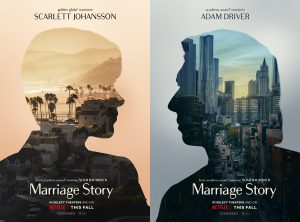
In an age when so many of us find ourselves at odds with others, it would be comforting to believe that we could at least find protection from those storms in the sanctuary of our relationships. Unfortunately, even those involvements aren’t always immune from the impact of such contentiousness, presenting us with another source of conflict, one that can be particularly disconcerting given the highly personal arena in which the disagreement unfolds. One can only hope that films like “Marriage Story” provide us with sufficient cautionary tales to avoid the pitfalls of relationships gone awry – and remind us of the tremendous joys that got us into them in the first place.
Copyright © 2019, by Brent Marchant. All rights reserved.
Sunday, December 22, 2019
‘Honey Boy’ explores the mixed signals behind tough love
“Honey Boy” (2019). Cast: Shia LaBeouf, Lucas Hedges, Noah Jupe, Byron Bowers, Laura San Giacomo, FKA Twigs, Natasha Lyonne, Clifton Collins Jr., Mario Ponce, Martin Starr. Director: Alma Har’el. Screenplay: Shia LaBeouf. Web site. Trailer.
Growing up under strict parents can be difficult. Their dictates can be a lot to handle, especially when it seems like there’s no getting away from them. And it can be that much more challenging when they dole out seemingly unusual, wholly irrational demands, particularly when combined with questionable behavior and physical abuse. However, as troubling as such conditions may be, sometimes there is a method to that madness, even if it goes unexplained. Such seemingly “tough love” is often misinterpreted as something else entirely, its underlying intent obscured by surface considerations that overshadow what’s behind them. That’s the challenge to be unraveled by a disturbed young adult in the intense new drama, “Honey Boy.”
Set in 2005, “Honey Boy” presents the semi-autobiographical tale of writer-actor Shia LaBeouf’s stormy relationship with his father while growing up as a child star in Hollywood. The story, told through flashbacks to a decade earlier, examines the struggle of now-adult acting prodigy Otis Lort (Lucas Hedges) as he goes through rehab, a requirement to keep him out of prison after several violent skirmishes with the police. During his therapy sessions with his counselor, Dr. Moreno (Laura San Giacomo), Otis reflects back on his upbringing, when his younger self (Noah Jupe) seeks to cope with the many erratic moods and explosive tantrums of his unpredictable father, James (LaBeouf), circumstances that have resulted in a diagnosis of PTSD. Recalling these repressed memories is a painful process, to be sure, but it’s what it takes if Otis ever hopes to recover and set himself on a healthy new path for the future.
[caption id="attachment_11162" align="aligncenter" width="350"] Former child star Otis Lort (Lucas Hedges) comes to terms with his troubled past while going through rehab in the new semi-autobiographical film, “Honey Boy.” Photo courtesy of Amazon Studios.[/caption]
Former child star Otis Lort (Lucas Hedges) comes to terms with his troubled past while going through rehab in the new semi-autobiographical film, “Honey Boy.” Photo courtesy of Amazon Studios.[/caption]
As the story unfolds, the elder Otis comes face to face with considerable anguish. He relives his childhood in a rundown motel complex with its many upsetting moments. At the same time, though, he also comes to see that he was the son of a father who generally stuck by him, despite his ample quirks and all through the many difficulties of their volatile relationship. This included Otis’s repeated “failures” in living up to his father’s expectations; their heated disagreement over Otis’s relationship with Tom (Clifton Collins Jr.), a volunteer from the Big Brother program, a protective venture recommended by Otis’s seldom-seen mother (Natasha Lyonne); and Otis’s eventual willingness to fight back and confront his dad on his bullshit, undoubtedly a source of his elder self’s eventual aggressive behavior. The emotional turbulence here was obviously ample and frequent, to be sure.
However, Otis also comes to realize that, no matter how tough James was on him, his dad always seemed to have his best interests at heart, even if it didn’t always appear that way. Having made many mistakes in his own life, James, a former and largely failed rodeo clown, pushes Otis hard in his work, because he recognizes his son’s talent and wants to see him succeed, to not make the same errors that he did. Granted, James’s methods didn’t always work, and he constantly struggled to stay sober after his own recovery, but he was present much of the time in his son’s life. The adult Otis seeks to reconcile these conflicted feelings, learning how to accept – and to forgive – his father for who he was and to thank him what he ultimately did for him.
Many of the themes that pervade this film echo those seen in another recent fact-based drama, “A Beautiful Day in the Neighborhood” (2019). Such topics as forgiveness, redemption and gratitude run through Otis’s story as he seeks to reconcile his feelings with his old man, much as they did for protagonist Lloyd Vogel (Matthew Rhys) with his estranged father, Jerry (Chris Cooper), in “Beautiful Day.” And here, as there, Otis finds his way with a supportive advisor, one who urges him to get in touch with – and to deal with – his feelings, difficult though that may be.
[caption id="attachment_11163" align="aligncenter" width="350"]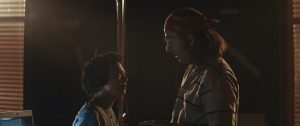 Acting prodigy Otis Lort (Noah Jupe, left) struggles with the many moods and quirks of his father, James (Shia LaBeouf, right), in director Alma Har’el’s latest offering, “Honey Boy.” Photo courtesy of Amazon Studios.[/caption]
Acting prodigy Otis Lort (Noah Jupe, left) struggles with the many moods and quirks of his father, James (Shia LaBeouf, right), in director Alma Har’el’s latest offering, “Honey Boy.” Photo courtesy of Amazon Studios.[/caption]
The process in both stories involves accessing the beliefs behind those feelings, the driving force in the manifestation of their respective realities. This is important to recognize, for this is the cornerstone principle of the conscious creation process, the philosophy that maintains we tap into these metaphysical building blocks in constructing the existence we experience. That’s precisely what Otis must do if he, like Lloyd, seeks to understand how and why his world unfolded as it did. It’s essential for him in appreciating how this made him the individual he has become and what he must grasp if he is ever to overcome his PTSD.
Again, like Lloyd, Otis underwent considerable pain, but, as he works his way through it, he also comes to grips with realizing how the experiences of his younger self helped prepare him for adulthood in a career as competitive as Hollywood moviemaking. He admittedly has his issues as a grown-up, but he also has a lot going for him. For instance, would success have come his way if James hadn’t pushed him to work so hard? That’s a question that probably can’t be answered definitively, but we do know for sure that he flourished in his career, in spite of – or perhaps because of – his challenged upbringing. Difficulty often helps to strengthen our tenacity, our willingness to succeed, to become who we were truly meant to be. In situations like that, a change in perspective, including rewritten beliefs about forgiveness, redemption and gratitude, may help us to connect the dots and realize how we became who we are, something for which we may even feel more than a little thankful.
This surprisingly good offering about a talented child star and his troubled father who uses tough love (sometimes a little too tough) to see his son succeed can be difficult to watch at times, given the harshness of his dad’s treatment. Some have also called the film somewhat self-indulgent, an argument not entirely without merit. However, director Alma Har’el’s latest also reveals how situations such as these aren’t necessarily black and white. Inventive cinematography and creative musical montages help to set this one apart from other similar releases, evoking heartfelt but not manipulative emotional responses. Think of this as a grittier, gender-switch, working class version of “Post Cards from the Edge” (1990), and you’ve got the idea what’s behind this one.
[caption id="attachment_11164" align="aligncenter" width="350"] Shia LaBeouf delivers a revelatory performance as a character based on his own father in the new semi-autobiographical drama, “Honey Boy.” Photo courtesy of Amazon Studios.[/caption]
Shia LaBeouf delivers a revelatory performance as a character based on his own father in the new semi-autobiographical drama, “Honey Boy.” Photo courtesy of Amazon Studios.[/caption]
Perhaps the greatest strength in this release is its performances. LaBeouf is a revelation, delivering an Independent Spirit Award-nominated supporting performance, one that’s far better than any other he has ever given. He’s backed by two fine portrayals by Hedges and Jupe, also an ISA supporting actor nominee, as well as a Critics Choice Award nominee for best young performer. The film also received additional Independent Spirit Award nods for best director and best screenplay.
Child-rearing receives more scrutiny today than perhaps ever before. Sensitivity to the welfare of kids under the thumb of dictatorial parents definitely deserves the increased attention it has received in recent years, especially for those living under the most vulnerable of circumstances. At the same time, those conditions must be examined carefully, for there may be more than meets the eye in such situations. This is by no means advocating unchecked torment, but, when the true meaning of what’s going on is explored, it may lead to a newfound understanding of what’s transpiring, for both parent and child – an awareness that can lead to the best outcome for all concerned, both during one’s upbringing and on into the future.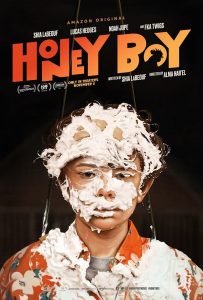
Copyright © 2019, by Brent Marchant. All rights reserved.
Tuesday, December 17, 2019
‘Beautiful Day’ extols the virtues of forgiveness
“A Beautiful Day in the Neighborhood” (2019). Cast: Tom Hanks, Matthew Rhys, Chris Cooper, Susan Kelechi Watson, Maryann Plunkett, Enrico Colantoni, Wendy Makkena, Tammy Blanchard, Noah Harpster, Christine Lahti, Carmen Cusack, Kelley Davies, Maddie Corman, Daniel Krell, Jessica Hecht. Director: Marielle Heller. Screenplay: Micah Fitzerman-Blue and Noah Harpster. Story: Tom Junod, “Can You Say… Hero?”, Esquire magazine, 1998. Web site. Trailer.
Forgiveness is one of the most renewing and fulfilling acts we can undertake. However, it can also be one of the most difficult and challenging endeavors we can pursue, especially when a loved one, such as a family member, is involved. Nevertheless, the rewards that come from such a compassionate venture can be immeasurable. Such is the case with a new fact-based film that explores this subject from the standpoint of fathers and sons, “A Beautiful Day in the Neighborhood.”
Hard-nosed investigative journalist Lloyd Vogel (Matthew Rhys) may be good at his job, but he’s not the kind of person who others readily warm up to. That’s especially true for the subjects of his Esquire magazine articles, who often feel worked over in the wake of his probing investigations. However, the gritty Gothamite has become so jaded by his work that he seems on the verge of burnout, not a good state of mind for the father of a newborn. That’s why a change of scene is very much in order, an opportunity that comes when he’s invited to attend the wedding of his sister, Lorraine (Tammy Blanchard). There’s just one hitch, though: In the wake of the invitation, Lloyd’s wife, Andrea (Susan Kalechi Watson), informs him that his long-estranged father, Jerry (Chris Cooper), will be there. Lloyd claims he’s cool with that, but his outward attitude is clearly concealing his real feelings under layers of irrefutable emotional camouflage.
Once at the wedding, Lloyd does his best to avoid interacting with Jerry, but they eventually run into one another, a tense encounter that quickly escalates and results in a fist fight. Lloyd’s not proud of his behavior, but he has no regrets, either. Nevertheless, after that incident, he’s no better off emotionally or psychologically than he was before the wedding.
[caption id="attachment_11154" align="aligncenter" width="350"]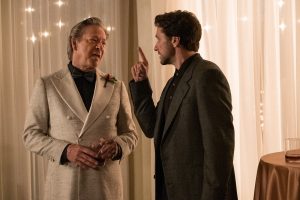 Long-estranged father, Jerry (Chris Cooper, left), and son, Lloyd (Matthew Rhys, right), experience a tense moment at a family wedding in the new fact-based drama, “A Beautiful Day in the Neighborhood.” Photo by Lacey Terrell, courtesy © 2019 CTMG, Inc.[/caption]
Long-estranged father, Jerry (Chris Cooper, left), and son, Lloyd (Matthew Rhys, right), experience a tense moment at a family wedding in the new fact-based drama, “A Beautiful Day in the Neighborhood.” Photo by Lacey Terrell, courtesy © 2019 CTMG, Inc.[/caption]
Upon his return to work, Lloyd’s editor (Christine Lahti) tells him about the magazine’s upcoming edition, a special issue devoted to the subject of heroes. She then gives him his next assignment, a profile of children’s TV icon Fred Rogers (Tom Hanks). Lloyd is floored – and embarrassed – by the assignment, one far from typical of what he does. But Lloyd’s forced into taking it when his editor tells him that Mr. Rogers was the only one of the issue’s profile prospects who would agree to speak with him. And so, with his tail between his legs and a busted-up face, Lloyd travels to Pittsburgh to meet his subject – and a surprise destiny.
Skeptical that anyone can be as nice as Mr. Rogers appears to be, the cynical Mr. Vogel goes into his interview with a chip firmly planted on his shoulder. However, when conversing with the soft-spoken television host, Lloyd is intrigued by, but nevertheless somewhat uncomfortable with, his subject. That’s especially true when they switch roles and Mr. Rogers starts asking the questions, a skill the TV host was notably adept at. Lloyd’s family life proves to be a particularly sensitive topic for Fred’s questioning, so he gently, but persistently, probes his subject to get at the source of what is obviously some tremendous though long-buried, unresolved pain. In their sessions together, Lloyd invariably tries to withdraw, but he always keeps coming back, each time going deeper into his consciousness and coming to terms, albeit reluctantly, with the demons that haunt him. And, as time passes, remarkable developments occur. But who would have thought that a children’s television show host could work such wonders with a hard-edged reporter?
Through their conversations, Lloyd gets to see that Mr. Rogers is more than just a puppeteer who shares wise but simplistic observations with a juvenile audience. He comes to recognize that the gentle soul has much to offer in helping to bring people together, especially those who have been hurt and are much in need of healing. Lloyd gradually realizes that Fred Rogers, in his own quiet way, truly is a hero, one who treads lightly but courageously into troubled territory, surrounded by hostile parties, and carefully mends heavily damaged fences through loving compassion, practical sage advice, and warm, inviting smiles. The experience provides Lloyd with a fresh perspective, one that gives him a new outlook that carries over into myriad areas of his life. Indeed, who said Mr. Rogers was just for kids?
[caption id="attachment_11155" align="aligncenter" width="350"]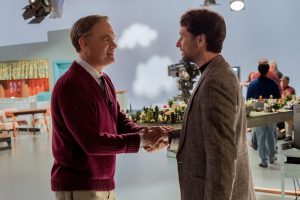 Hard-nosed investigative journalist Lloyd Vogel (Matthew Rhys, right) meets his unlikely interview subject, children’s TV icon Fred Rogers (Tom Hanks, left), in director Marielle Heller’s “A Beautiful Day in the Neighborhood.” Photo by Lacey Terrell, courtesy © 2019 CTMG, Inc.[/caption]
Hard-nosed investigative journalist Lloyd Vogel (Matthew Rhys, right) meets his unlikely interview subject, children’s TV icon Fred Rogers (Tom Hanks, left), in director Marielle Heller’s “A Beautiful Day in the Neighborhood.” Photo by Lacey Terrell, courtesy © 2019 CTMG, Inc.[/caption]
Individuals living with circumstances like Lloyd’s often feel stuck. They see things as unchangeable, largely because those conditions arose out of events that themselves can’t be changed. Consequently, they become dug in, convinced that they’ll have to live with those arrangements for the rest of their lives.
But do they?
Based on the events depicted here, Lloyd’s circumstances are what they are because he believes them to be that way, and, given the strength and tenacity of those beliefs, they’ve anchored him into a mindset that seems unalterable. That’s not surprising, though, given that’s how the conscious creation process works, the philosophy that maintains our thoughts, beliefs and intents manifest the reality we experience. And, the more power we give to them, the more persistent they become, perhaps even stubbornly so. In light of that, then, is it any wonder that such conditions become pervasive and locked in?
But need that be the case forever? As conscious creators know, we choose the beliefs we hold, which inherently means that they’re capable of change – provided we allow that to happen. In Lloyd’s case, unfortunately, he’s become so ingrained in his thinking that he can’t see his way out of it. He’s holding on to the past hurts of his father abandoning his family and leaving them to fend for themselves during the hard times that followed, a particularly difficult period when Lloyd’s mother, Lila (Jessica Hecht), became ill and died. He’s unable to forgive Jerry, which is certainly understandable, but, in the end, who is Lloyd really hurting by so firmly and unrelentingly grasping that view?
[caption id="attachment_11156" align="aligncenter" width="350"] Loving father Lloyd Vogel (Matthew Rhys, left) seeks to build a healthy, happy life with his wife, Andrea (Susan Kalechi Watson, right), and young son in “A Beautiful Day in the Neighborhood.” Photo by Lacey Terrell, courtesy © 2019 CTMG, Inc.[/caption]
Loving father Lloyd Vogel (Matthew Rhys, left) seeks to build a healthy, happy life with his wife, Andrea (Susan Kalechi Watson, right), and young son in “A Beautiful Day in the Neighborhood.” Photo by Lacey Terrell, courtesy © 2019 CTMG, Inc.[/caption]
The irony in Lloyd’s outlook is that he’s alone in his family when it comes to that perspective. By virtue of the fact that his sister Lorraine invited their father to the wedding, she’s obviously changed her view and let go of the pain. Similarly, Jerry has made a concerted effort to get over the mistakes of his past, forgiving himself for his actions and seeking the same from his kids in an effort to reconnect with them, extending an olive branch that couldn’t have been easy to share. But Lloyd is dug in, unable – or unwilling – to change his stance. That is, until he meets Mr. Rogers.
Through a series of sensitive, kind, calm conversations, as well as various compassion-based exercises, Fred works with Lloyd to break down the previously intractable barriers, to help him reconsider and rewrite his beliefs. Mr. Rogers can clearly see that Lloyd wants to alleviate himself of the pain he’s been carrying around for so many years; he simply helps Lloyd see how to do it and what to replace those outmoded beliefs with. It’s a valuable tool for not only helping Lloyd change his relationship with his father, but also to alter his view of the world at large, making it possible for him to adopt a fresh perspective to see how his overall reality operates. Charting a new course for oneself can be life-changing when we’re stuck in a longstanding rut, and Lloyd at last has an opportunity to see how to make that happen.
At the core of this, obviously, is the matter of forgiveness. As many alternate thought practitioners maintain, forgiveness is an act that often benefits the individual who extends it as much as, if not more than, the person to whom it is extended. Holding on to the beliefs that prevent reconciliation from happening becomes an increasingly great burden over time, one that requires tremendous energy to maintain – energy that could certainly be put to far more productive purposes than holding a grudge. The catharsis that comes from forgiving thus eliminates the burden and frees up energy that has been locked away in a long-simmering and ultimately fruitless pursuit.
[caption id="attachment_11157" align="aligncenter" width="350"]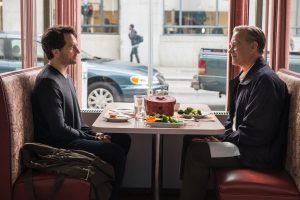 Hard-nosed investigative journalist Lloyd Vogel (Matthew Rhys, left) learns how to invoke a moment of stillness – a practice that can be successfully implemented any time and anywhere, even a busy Chinese restaurant – to go within and become introspective, an exercise taught him by children’s television icon Fred Rogers (Tom Hanks, right) in “A Beautiful Day in the Neighborhood.” Photo by Lacey Terrell, courtesy © 2019 CTMG, Inc.[/caption]
Hard-nosed investigative journalist Lloyd Vogel (Matthew Rhys, left) learns how to invoke a moment of stillness – a practice that can be successfully implemented any time and anywhere, even a busy Chinese restaurant – to go within and become introspective, an exercise taught him by children’s television icon Fred Rogers (Tom Hanks, right) in “A Beautiful Day in the Neighborhood.” Photo by Lacey Terrell, courtesy © 2019 CTMG, Inc.[/caption]
Such is the stuff of redemption, which, in many ways, is little more than embracing a new choice for oneself. Granted, the scale and magnitude of the choice may be much greater than what’s involved in something as mundane as deciding what to have for dinner, but it nevertheless comes down to a central question of choice, one that opens new doors for the chooser and those whom this decision affects. There’s a lot to be said for a fresh start, and redemption makes that possible.
Forgiveness and redemption also provide us with much else to consider, particularly when it comes to evaluating why we went through what we did. For example, in Lloyd’s case, his difficulties growing up arguably did much to toughen him up and give him a thick skin – qualities that come in quite handy for someone aspiring to be an investigative journalist. And, given Lloyd’s success in his career, those attributes served him well in his work. Would such an outcome have occurred had it not been for the personal experiences he underwent during his upbringing? That probably can’t be answered definitively, but many professional success stories often cite their own life experiences as significant influences in how and why they achieved the results that they have.
Reflecting on such matters provides us with a new perspective on why we may have held on to some of the seemingly “unproductive” beliefs of our past. Such introspection helps to show us how we became who we have become. And, if our successes have arisen from such beliefs and resulting experiences, despite (or perhaps because of) the hardships, then there’s something to be thankful in that, perhaps even some gratitude that might not have been readily apparent at first glance.
While Lloyd did most of the heavy lifting in changing his life, Fred Rogers is certainly due his share of the credit for helping him turn things around. It’s impressive that he was able to work such wonders by simply engaging in thoughtful conversation, but words and ideas have tremendous power, tools readily capable of changing beliefs (and we can all see what that’s capable of). This came easily and naturally to Fred, and he was tremendously successful at it, but, then, that’s because he was engaging in his value fulfillment, the conscious creation concept associated with being our best and truest selves for the betterment of ourselves and those around us.
[caption id="attachment_11158" align="aligncenter" width="350"]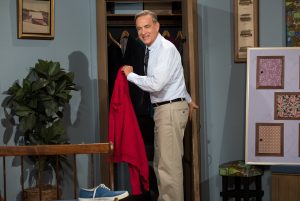 Children’s TV icon Fred Rogers (Tom Hanks) works his magic on an unlikely subject in the new fact-based drama, “A Beautiful Day in the Neighborhood.” Photo by Lacey Terrell, courtesy © 2019 CTMG, Inc.[/caption]
Children’s TV icon Fred Rogers (Tom Hanks) works his magic on an unlikely subject in the new fact-based drama, “A Beautiful Day in the Neighborhood.” Photo by Lacey Terrell, courtesy © 2019 CTMG, Inc.[/caption]
Fred’s plainspoken but heartfelt wisdom left quite a legacy, one that we need in these troubled, noisy and polarized times. Through this film and the excellent documentary “Won’t You Be My Neighbor?” (2018), viewers are provided with an in-depth look at the TV icon’s insights, giving us an opportunity to see just how valuable they are for living, especially coping with the unsettling social climate we face today. It’s interesting to note how Mr. Rogers is relegated to a supporting role here, but that serves to illustrate the true power in what he espouses, that these “background” ideas, when brought to the surface, can have abundant impact in transforming the nature of the greater reality of which they’re a part. Such notions have the capability to truly manifest a beautiful day in “the neighborhood” at large.
Director Marielle Heller’s heart-tugging tale of redemption and forgiveness is the sort of soothing tale we could use more of these days. Hanks delivers an outstanding, exceedingly reverent portrayal of the legendary and unlikely television star, as does Cooper as the long-absent and now-penitent father figure. This heartwarming yarn’s innate predictability is creatively offset by a variety of inventive cinematic techniques and clever storytelling tactics, particularly in its whimsical production design, which lovingly mimics the low-tech sets of Rogers’ television show. Admittedly, the picture could have used a stronger male lead than Rhys, and the back story of the protagonist’s conflict with his father could have been fleshed out a little more, but the film otherwise comes through with a comfortable, calming likability that quietly but effectively makes its point without browbeating the audience.
As one watches “Beautiful Day,” one would swear that Hanks is channeling the spirit of Mr. Rogers. His effort has paid off, too, earning him best supporting actor nominations in the Golden Globe, Critics Choice and Screen Actors Guild Award programs. In addition, this fictionalized retelling of journalist Tom Junod’s experience and relationship with his soft-spoken but famous friend also captured a Critics Choice Award nomination for best adapted screenplay.
In this holiday season, when the spirit of goodwill tends to be on everyone’s mind perhaps a little more than at other times of the year, it helps to have films like this to remind us of the power of forgiveness. It may seem a little strange that someone as unlikely as Mr. Rogers can so pointedly show us the rewards that come from invoking it in our lives. But, if doing so can help to bring peace of mind to the weary among us, there’s certainly something remarkable to be said for that.
Copyright © 2019, by Brent Marchant. All rights reserved.
Sunday, December 15, 2019
Now on iHeart Radio!
The Good Media Network is pleased to announce that its podcasts are now featured on iHeart Radio! Fans of Frankiesense & More can find it by clicking here. And those interested in TGMN’s sister broadcast, Mission Unstoppable, can find it by clicking here. Archived editions of past shows are available on both links, including the Movies with Meaning segments featuring yours truly. So, if you’re looking for a current show or you missed a past episode, or if you just want to go back and listen to your favorites again, check out the iHeart sites and enjoy!



This Week in Movies with Meaning
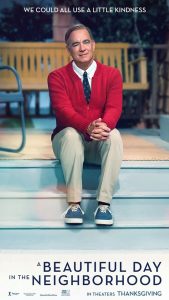

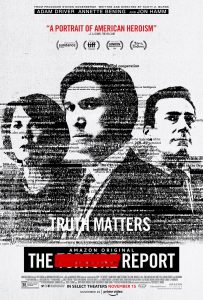
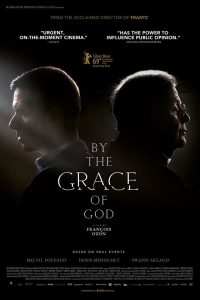

‘The Report’ chronicles the heroic pursuit of an ugly truth
“The Report” (2019). Cast: Adam Driver, Annette Bening, Corey Stoll, Jon Hamm, Maura Tierney, Michael C. Hall, Tim Blake Nelson, Linda Powell, Victor Slezak, Scott Shepherd, John Rothman, Ted Levine, Douglas Hodge, T. Ryder Smith, Fajer Kaisi, Zuhdi Boueri, Ratnesh Dubey, Carlos Gómez, Pun Bandhu, Joanne Tucker, Ian Blackman, Damian Fumusa, Joseph Siravo, Jennifer Morrison, Alexander Chaplin, Evander Duck Jr., Matthew Rhys. Archive Footage: Barack Obama, Dick Cheney, Donald Rumsfeld, John McCain, John Kerry. Director: Scott Z. Burns. Screenplay: Scott Z. Burns. Story: Katherine Eban, “Rohrschach and Awe,” Vanity Fair magazine, July 2007 (uncredited). Web site. Trailer.
Exposing a painful truth is never easy. That’s especially the case when those who have much to lose hinder the process by nefariously intentional interference to conceal its ugly revelations. Thankfully, though, there are those who are staunchly committed to seeing that justice, honesty and integrity are served, a quest detailed in the riveting new historical drama, “The Report.”
Things changed considerably for many individuals and institutions in the wake of the 9/11 terrorist attacks. For Daniel J. Jones (Adam Driver), that meant an alteration in his career path. He felt a need to become involved in something that would make a difference in the aftermath of that horrendous day, so he sought work in the intelligence field. He spent several years amassing experience with the FBI before becoming a Senate staffer working for Sen. Dianne Feinstein (D-CA) (Annette Bening). In this new capacity, Jones was charged with investigating the government’s Enhanced Interrogation Techniques (EIT) program, a controversial initiative implemented by the Bush Administration to use new methods for drawing out information from suspected terrorists.
Through a series of flashbacks, the genesis of the EIT program is detailed to illustrate what Jones was assigned to investigate. Viewers witness examples of such techniques as waterboarding, extreme sleep deprivation and even simulated coffin burials that government officials employed in hopes of extracting vital information about terrorist organizations and their plans for possible future attacks. However, given the questionable techniques used, it became widely apparent that they constituted torture, going beyond what were generally considered acceptable interrogation practices, measures seen as unacceptable for a nation that claimed to represent itself as the pinnacle of justice and fair treatment of prisoners.
[caption id="attachment_11131" align="aligncenter" width="350"] Fearless and idealistic crusaders Sen. Dianne Feinstein (D-CA) (Annette Bening, left) and Senate staffer Daniel J. Jones (Adam Driver, right) seek to exposure the dark secrets of the CIA’s Enhanced Interrogation Techniques (EIT) program in the wake of the 9/11 terrorist attacks in the gripping new fact-based political thriller, “The Report.” Photo by Atsushi Nishjima, courtesy of Amazon Studios.[/caption]
Fearless and idealistic crusaders Sen. Dianne Feinstein (D-CA) (Annette Bening, left) and Senate staffer Daniel J. Jones (Adam Driver, right) seek to exposure the dark secrets of the CIA’s Enhanced Interrogation Techniques (EIT) program in the wake of the 9/11 terrorist attacks in the gripping new fact-based political thriller, “The Report.” Photo by Atsushi Nishjima, courtesy of Amazon Studios.[/caption]
But the severity of the treatment was not the only problem. Due to the intensity of the techniques and the perceived need to repeat them – sometimes as many as 186 times – to draw out crucial information, it became an expensive program, especially given the many suspects who were apprehended and interrogated. Even more distressing, though, was the fact that the techniques didn’t work; suspects ended up saying anything to get the torture to stop, which meant that government officials were being told lies or were being supplied with information already in their possession. The suspects themselves often weren’t who they were believed to be, and, even if they were involved with terrorist groups, they were usually low-level participants far from the big players the government thought it had captured. (So much for the effectiveness of a supposedly “better” approach.)
Jones, who initially believed that the government should do whatever it could to keep the public safe, gradually had a change of heart the further he got into his investigation. He came to see the fiscal waste, the inhumane treatment and the undeniable ineffectiveness of the program up close and in great detail. While many in the Bush Administration saw it as an essential element of its antiterrorism efforts, Jones and Feinstein came to realize it was nothing more than a huge, expensive embarrassment for the nation, one that didn’t yield any new or meaningful intelligence – and that ultimately didn’t prevent any of the alleged attacks that were supposedly in the works. Even the eventual capture of alleged 9/11 mastermind Osama bin-Laden came about as a result of information derived from sources other than those subjected to the EIT program.
Amassing these findings wasn’t easy, either. The CIA, the driving force behind the EIT program, was less than cooperative, implementing measures that hindered the investigation. For instance, the agency refused to allow its staff members to be interviewed. Thus, to get the information he needed, Jones was forced into sorting through voluminous emails and other archived communications, a tedious and time-consuming process for someone with limited staff to assist him. What’s more, all of this work had to be conducted at a clandestine CIA facility from which nothing could be removed under penalty of prosecution.
Understandably, Jones became frustrated by the process, especially when he uncovered increasingly damning evidence about the program. Opposition from the intelligence community, backed by sympathetic (some would say collaborative) parties within other branches of government (including Congress), stifled Jones’s efforts. In addition, to dilute and counter whatever credibility he was beginning to develop, those seeking to protect the program made sure its supposed accomplishments were sufficiently trumpeted in the media, a move aimed at solidifying public support. This even became evident through entertainment vehicles like the film “Zero Dark Thirty” (2012), a Hollywood production detailing the “official” events involved in the raid on bin-Laden’s secret compound in Pakistan.
[caption id="attachment_11132" align="aligncenter" width="350"]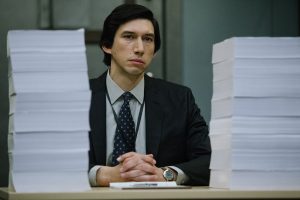 Having written a nearly 7,000-page report about the dark secrets of the CIA’s Enhanced Interrogation Techniques (EIT) program, Senate staffer Daniel J. Jones (Adam Driver) struggles to get the document released in the face of strong opposition in director Scott Z. Burns’s new political thriller, “The Report.” Photo by Atsushi Nishjima, courtesy of Amazon Studios.[/caption]
Having written a nearly 7,000-page report about the dark secrets of the CIA’s Enhanced Interrogation Techniques (EIT) program, Senate staffer Daniel J. Jones (Adam Driver) struggles to get the document released in the face of strong opposition in director Scott Z. Burns’s new political thriller, “The Report.” Photo by Atsushi Nishjima, courtesy of Amazon Studios.[/caption]
For Jones, this exercise was an eye-opener. As someone who initially firmly believed in the government’s official efforts, he gradually became disillusioned, even angry, at what he found. Keeping his composure in light of his mission became increasingly difficult, especially when attempts at keeping his findings from being revealed were ramped up and officially sanctioned by members of Congress. Such was the case not only during the Republican administration of George W. Bush but also during what was seen as the supposedly friendlier Democratic administration of Barack Obama. These increasingly onerous obstacles eventually drove him to consider actions that placed his own career in jeopardy in order to make the truth known. He risked the possibility of prosecution for his ideals – and those of what he believed were the nation’s as well.
Fortunately, throughout this process, Jones had Feinstein’s backing, a fierce level of support that gave him what he needed but that simultaneously threatened to damage her own clout and credibility. Nevertheless, Jones and Feinstein were committed to release their nearly 7,000-page report, a battle that pitted them against powerful Washington influences and prompted them to seek the assistance of some seemingly unlikely allies, including those on the other side of the political aisle. To them, the truth was more important than any potentially embarrassing consequences that might emerge from these revelations. But, then, for a nation that claims to stand as a shining example of democracy for the world, this was seen as essential to minimize the damage wrought by the questionable deeds and blatant hypocrisy that led them to this point.
The 9/11 tragedy took so many of us by surprise that we were unsure how to react. Some were afraid and desperately wanted security. But not everyone was in agreement on how to go about attaining it. Many sought safety while preserving justice. Others, however, pursued protection at any cost, even if that meant resorting to vengeful and questionable tactics. Admittedly, this was new territory for virtually everyone, so coming to consensus on how to proceed was far from easy, especially on what approaches to employ. The differences among us were driven by our individual beliefs, and that’s significant, for they dictate how events unfold, the result of what happens through the conscious creation process, the philosophy that maintains we draw upon those notions in manifesting the reality we experience. And, as this film shows, the variances in beliefs were great, a disparity that accounted for the diverse outcomes that resulted while addressing the aforementioned need for security.
Many Americans wanted to be safe but to achieve that security through tough but fair and just means. That’s exemplified here by Jones’s sincere idealism. However, there were also those who believed in attaining protection by any means possible, even if by unapologetically tapping into more ruthless tactics driven by qualities like vengeance and vindictiveness. And that outlook is apparent here in the attitudes and practices of those in power, those who, at least initially, wielded the greatest and most readily deployable reserves of metaphysical and tangible resources needed for effectively and clandestinely carrying out such plans. Those methods were artfully clothed in zealous, patriotic rhetoric designed to cultivate the support of a wary but grateful public that was intentionally shielded from knowing the truth about what was really going on. Had citizens known what their elected officials were really up to – and how their tax dollars were being spent – they may not have been so willing to give their leaders a blank check to provide them with the security they sought, especially since that protection didn’t come about as a result of those questionable tactics in the first place.
[caption id="attachment_11133" align="aligncenter" width="350"] Risking her reputation to fight for the release of a document critical of the intelligence community, Sen. Dianne Feinstein (D-CA) (Golden Globe Award best supporting actress nominee Annette Bening) stands her ground in the face of significant opposition in “The Report,” now available for streaming on Amazon.com. Photo by Atsushi Nishjima, courtesy of Amazon Studios.[/caption]
Risking her reputation to fight for the release of a document critical of the intelligence community, Sen. Dianne Feinstein (D-CA) (Golden Globe Award best supporting actress nominee Annette Bening) stands her ground in the face of significant opposition in “The Report,” now available for streaming on Amazon.com. Photo by Atsushi Nishjima, courtesy of Amazon Studios.[/caption]
This is where the work of Jones and Feinstein became so important. They sought to expose the deception, the atrocities and the waste involved in the EIT program. They believed in providing security to the public, to be sure, but they also believed in upholding the principles that the country claimed to stand for in achieving that goal.
Jones and Feinstein faced many obstacles in bringing that information to light, but they had something going for them in their beliefs that their opponents didn’t – integrity. They were being honest with themselves and their constituents in how and why they went after the evidence they sought. They believed in being above board and making sure their investigation and its findings reflected that. Their results bore that out, too.
Meanwhile, those who developed and implemented the EIT program ultimately failed because it arose out of beliefs and assertions that were innately short on integrity. On some level, they knew their tactics didn’t align with the ideals that America stood for, even if they tried using the terrorist threat to “justify” what they were doing. It probably had something to do with why they also fiercely tried to keep information about the program under wraps, rationalizing their efforts as being in the interests of national security, even though that undertaking probably had more to do with keeping their merciless practices from seeing the light of day. But, then, those outcomes shouldn’t come as any surprise from a plan that arose from beliefs based on a fundamental lack of integrity to begin with.
Even if the developers of the EIT program were to believe in the validity of what they were doing, their efforts nevertheless reflect the practice of un-conscious creation or creation by default. This occurs when we are so focused on using our beliefs to attain a particular goal that we give no credence to the consequences that can result from our efforts. By paying no attention to the fallout that can come from implementing a particular initiative, we run the risk of overlooking, and subsequently experiencing, all manner of unintended side effects. Those behind the program no doubt discovered that when one of their subjects died as a result of their practices, an outcome that they were convinced couldn’t happen. Yet, when their victim ended up succumbing to the injuries they inflicted upon him, he was nevertheless dead, despite supposed assurances to the contrary.
Given what Jones and Feinstein were up against, making meaningful progress required some creative thinking. First, they had to overcome whatever fears they might have had. Considering that they were facing the considerable power of the intelligence community, it’s not too hard to believe that they could have easily been intimidated. It was essential that the investigators dispense with any fear-based beliefs that might hold them back. That meant embracing courageous and heroic perspectives as they proceeded in their efforts.
[caption id="attachment_11134" align="aligncenter" width="350"]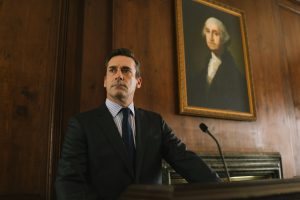 Denis McDonough (Jon Hamm), Chief of Staff to President Barack Obama, walks a tightrope to accommodate the needs of those with differing political agendas in the new fact-based drama, “The Report.” Photo by Atsushi Nishjima, courtesy of Amazon Studios.[/caption]
Denis McDonough (Jon Hamm), Chief of Staff to President Barack Obama, walks a tightrope to accommodate the needs of those with differing political agendas in the new fact-based drama, “The Report.” Photo by Atsushi Nishjima, courtesy of Amazon Studios.[/caption]
Then there was the need to become innovative in their thinking. Given the expert manipulative prowess of intelligence operatives, Jones and Feinstein faced the real possibility of being deceived, misdirected and stonewalled in their work. This thus called for employing inventive strategies and practices, such as drawing upon the information embedded in agency emails and cables in lieu of evidence gleaned from in-person interviews with those who participated in the program. They also drew heavily upon information online, some of which was surprisingly revelatory (perhaps even to the CIA itself). These approaches may have been more time-consuming and arduous, but they nevertheless yielded vast veins on intelligence gold – material that, had it not surfaced, wouldn’t have given the investigators what they needed to prepare their report.
The same was true when government insiders tried to block the release of Jones’s report, an initiative driven largely by partisan considerations. To counter this, Feinstein saw the need to step across the political aisle and recruit Republican support, an effort that earned her the backing of Sen John McCain (R-AZ). With the investigation now receiving bipartisan support – especially with that of two highly influential Senators from different political camps – opponents of the release of its findings found it more difficult to find friends who would give them and the program unlimited cover.
Most of all, though, the work of Jones and Feinstein reveals their commitment to their personal value fulfillment, the conscious creation concept associated with being their best, truest selves for the betterment of themselves and the world at large. The investigators were dedicated to exposing the truth about the EIT program, even in the face of potentially high political and career costs. They were convinced that it was the right thing to do, no matter how challenging, and they pursued it with unflinching zeal, even when the going got tough. Those who claim to call themselves true defenders of American ideals should thank them for what they did – for exposing an ugly and hypocritical incident in our nation’s history and making a betrayed public aware of what really went on.
This meticulously detailed, methodically explained history of the efforts to prepare the controversial Senate report is one of the year’s most underrated offerings. Its excellent performances by Driver, Golden Globe Award nominee Annette Bening and a fine ensemble of supporting players enliven a story that otherwise could have been potentially tedious. The picture’s razor-sharp script not only delivers the facts, but it does so with edgy wit and just the right amount of cynicism to expose the true nature of what was really going on during a turbulent period in the nation’s history, when ethics were placed on the chopping block in favor of expediency and the fulfillment of dubious agendas. It’s a smart, savvy, eye-opening offering that every truly loyal American should see.
Unfortunately, “The Report” has not received the notoriety and attention it deserves. The movie played the film festival circuit during the fall, followed by a limited (and all-too-brief) theatrical run. Thankfully, the picture is now available for streaming on Amazon.com.
For all of the Daniel Joneses of the world, there are those who would willingly do just the opposite of what he sought to accomplish. That’s unfortunate, too, for every scandal and misdeed that remains unexposed hurts us all in the long run. Given that, we can only hope that the courageous crusaders among us find the wherewithal – and the support – to step up and pursue their destiny, to shed light on the darkness and make it apparent for all to see. That’s truly heroic, a quest to which we should all aspire.
Copyright © 2019, by Brent Marchant. All rights reserved.
Sunday, December 8, 2019
‘Grace of God’ examines the struggle to liberate trapped courage
“By the Grace of God” (“Grâce à Dieu”) (2018 production, 2019 release). Cast: Melvil Poupaud, Denis Ménochet, Swann Arlaud, Eric Caravaca, François Marthouret, Bernard Verley, Martine Erhel, Hélène Vincent, François Chattot, Frédéric Pierrot, Aurélia Petit, Julie Duclos, Jeanne Rosa, Amélie Daure, Nicolas Bridet, Pierre Lottin, Stéphane Brel, Martine Schambacher, Max Libert, Nicolas Bauwen, Laurence Roy, Jacques Lagarde, Davan Collin, Jules Gauzelin, Noah Richard. Director: François Ozon. Screenplay: François Ozon. Web site. Trailer.
Working up the necessary courage to conquer fears that we believe cannot be vanquished can be one of the most difficult and terrifying challenges we can undertake. The effect can be paralyzing, leaving us stuck in a hellish limbo that feels like it has no end. But, with the right perspective, that need not be the case as a group of victimized individuals discover for themselves in the new fact-based French drama, “By the Grace of God” (“Grâce à Dieu”).
Middle-aged family man Alexandre Guérin (Melvil Poupaud) appears to lead a happy life with his wife, Marie (Aurélia Petit), and his five children in Lyon, France. But lurking beneath the veneer of happiness lies a dark secret that he has rarely revealed – that he was sexually abused by a priest, Fr. Bernard Preynat (Bernard Verley), while growing up. The series of indiscretions occurred primarily while Alexandre was at a church-sponsored scout camp in Ireland at which Fr. Preynat served as counselor – and resident predator. It’s something that has haunted Alexandre ever since.
[caption id="attachment_11122" align="aligncenter" width="350"]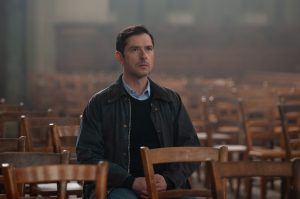 Middle-aged husband and father Alexandre Guérin (Melvil Poupaud) struggles with his memories of childhood abuse at the hands of a priest in the new fact-based drama, “By the Grace of God” (“Grâce à Dieu”). Photo courtesy of Music Box Films.[/caption]
Middle-aged husband and father Alexandre Guérin (Melvil Poupaud) struggles with his memories of childhood abuse at the hands of a priest in the new fact-based drama, “By the Grace of God” (“Grâce à Dieu”). Photo courtesy of Music Box Films.[/caption]
When Alexandre learns that his aging abuser has escaped prosecution in the time since then – and that Fr. Preynat has always been transferred to a new parish whenever issues arose – he’s appalled, especially when he hears that the troubled priest has been reassigned yet again to a new venue in which he’s charged with teaching Bible study classes to young children. He decides to take action by speaking up and calling out the abuses to the head of the diocese, Cardinal Barbarin (François Marthouret), hoping that it will lead to some kind of action. He gives a detailed, explicit statement to the Cardinal’s aide, Régine Mayor (Martine Erhel), who arranges an intervention between Alexandre and Preynat. At that meeting, the victim confronts his perpetrator, who freely admits his acts but who refuses to apologize.
Needless to say, Alexandre is left disappointed. Upset at the outcome, he arranges to meet the Cardinal in person. He sympathizes with Alexandre’s plight, but he refuses to take any action that might damage the church’s reputation with the public, a decision that further outrages the aggrieved victim. Alexandre thus decides to take matters into his own hands, a plan that he hopes will result in prosecution.
In launching this effort, however, Alexandre learns that he, like many other of Preynat’s victims, is unable to bring suit, because the 20-year statute of limitations has run on whatever potential claim he might try to make. If he’s to get any meaningful results, he needs to identify others who are still eligible to legitimately file a claim.
Alexandre begins his quest by networking with others, starting with his friend Olivier (Nicolas Bridet), who was also abused. Through connections developed by the two of them, they find others who were also victimized by Fr. Preynat, most notably Gilles Perrot (Eric Caravaca) and François Debord (Denis Ménochet), who take the lead in establishing a formal victims’ network on the Internet. This, in turn, brings them into contact with Emmanuel Thomassin (Swann Arlaud), a victim whose statute of limitations has not yet expired. At Last, Alexandre, Gilles and François have found someone who can bring a valid and timely case.
[caption id="attachment_11123" align="aligncenter" width="350"]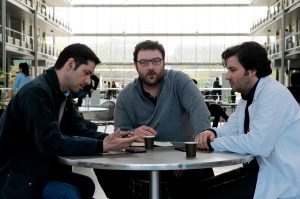 Childhood sexual abuse victims Alexandre Guérin (Melvil Poupaud, left), François Debord (Denis Ménochet, center) and Gilles Perrot (Eric Caravaca, right) organize an Internet-based victims’ network to connect others affected in “By the Grace of God” (“Grâce à Dieu”). Photo courtesy of Music Box Films.[/caption]
Childhood sexual abuse victims Alexandre Guérin (Melvil Poupaud, left), François Debord (Denis Ménochet, center) and Gilles Perrot (Eric Caravaca, right) organize an Internet-based victims’ network to connect others affected in “By the Grace of God” (“Grâce à Dieu”). Photo courtesy of Music Box Films.[/caption]
Emmanuel is troubled by his experience, it having left him saddled with a variety of personal problems, both physical and psychological. However, he summons up the courage to make a statement to the police, an investigation led by Capt. Cousteau (Frédéric Pierrot), who aggressively seeks to prosecute. Justice, it seems, may at last be on the way.
Of course, Preynat is not the only one on the hook. When word begins to circulate that his superiors knew what was going on and took no action – despite Preynat’s pleas for help to them about his problem – suddenly the church hierarchy gets put under the microscope. And, as the victims’ network turns up the heat, what began as one man’s search for justice turns into a full-blown public scandal, with considerable consequences on the line.
The issue of predatory priests has affected Roman Catholic dioceses around the globe, and the fallout has been extensive, especially in light of the church’s delayed and inadequate responses to the problem. It has become the subject of widespread media coverage, and the story has made its way into a number of films, such as this one, as well as the Academy Award winner for best picture, “Spotlight” (2015). It’s a story that has shaken the faith and trust that many have long placed in this centuries-old religious institution. However, the human cost of this travesty has not surfaced in detail as much as it has through this picture, bringing the question down to a more personal scale than perhaps any of the other treatment of this subject thus far.
Many of the personal considerations that this film raises concern basic issues of how individuals in their developmental years relate to the world around them. In this crucially formative age, they learn the ways of the world and form beliefs about how it works and what their role in it should be. These beliefs are critical, for they shape their holders’ views of reality and how it unfolds, especially where matters involving their relationships to authority figures are concerned. They learn about concepts like obedience and conformity and what it takes to comply with them, based on what people they come to trust tell them to do – even if what they’re told is not in their best interests.
This is important because what transpires helps to set their belief patterns for living, for the manifestation of their existence, the core principle underlying the conscious creation process, the philosophy that maintains we draw upon these metaphysical building blocks in the materialization of our world. And, given the fact that they have been intentionally led to believe that the heinous acts inflicted upon them are perfectly acceptable by those they’ve been taught to trust implicitly, the deception they’ve been falsely guided into embracing makes the crimes that much more odious.
For the victims who were so horribly misled, this abomination has created a number of problems. To begin with, it has caused them to accept beliefs in the validity of the abhorrent acts perpetrated against them. In turn, that has led them to embrace a belief formation process – and, subsequently, a view of reality and its creation – that’s far from healthy. And, once they discover what’s been allowed to transpire, they’re left confused, disillusioned, betrayed and damaged in countless ways, affecting them psychologically, emotionally, and, in some cases, physically.
[caption id="attachment_11124" align="aligncenter" width="350"] Emmanuel Thomassin (Swann Arlaud), a childhood sexual abuse victim still eligible to file suit against his perpetrator, contemplates how to proceed in director François Ozon’s “By the Grace of God” (“Grâce à Dieu”). Photo courtesy of Music Box Films.[/caption]
Emmanuel Thomassin (Swann Arlaud), a childhood sexual abuse victim still eligible to file suit against his perpetrator, contemplates how to proceed in director François Ozon’s “By the Grace of God” (“Grâce à Dieu”). Photo courtesy of Music Box Films.[/caption]
For many of the victims, once they learned these painful truths, they were stricken in fear. They were unable to come forward for various reasons. Some were ashamed of their behavior and were reluctant to admit it, even though they did not initiate it. Others were afraid to speak up for fear of the implications that could come for calling out authority figures, particularly authority figures who they had been taught to trust. And still others feared the power of an institution that they believed could come down on them for becoming whistleblowers, with ramifications that included everything from ridicule to perhaps even the fate of their eternal souls.
To rectify this situation, however, the victims had to learn how to overcome these fears, to be willing to step up and call out those who abused them. This meant rewriting their beliefs about their fears and replacing them with courage-based notions that would give them the strength and conviction to do what it would take to speak their minds and publicly identify the perpetrators, as well as their enablers and collaborators.
This was not easy, to be sure. Through flashbacks involving their younger selves (Davan Collin, Jules Gauzelin, Noah Richard), Alexandre, François and Emmanuel relive what happened to them, this time with a new awareness of what took place in light of their new beliefs. In addition to bolstering themselves in the face of these heightened apprehensions, the victims also had to muster the courage needed to face the blowback that would come from their actions, particularly in such a staunchly Catholic nation as France, where the institution has long enjoyed virtually unflinchingly blind public support. The challenge in that, obviously, was considerable.
What’s more, the victims not only faced opposition from the church, but also from sources closer to home. Immediate family members, such as Alexandre’s parents (Laurence Roy, Jacques Lagarde) and François’s parents (Hélène Vincent, François Chattot), were unsupportive – sometimes even critical – of their sons’ activism. At the time of the abuse, their parents were generally indifferent or unwilling to do anything, even when they had their own suspicions, either because they didn’t want to make waves or out of fear of what the church might do to them. And, when their sons spoke up as adults, their support was lacking or tepid; Alexandre’s parents encouraged him to let go of what happened all those years ago, hoping that the situation would just go away; and François’s parents, though upset at what transpired and embarrassed by their lack of past oversight, were noticeably uncomfortable with everything coming to the surface and in the bright light of day.
[caption id="attachment_11125" align="aligncenter" width="350"]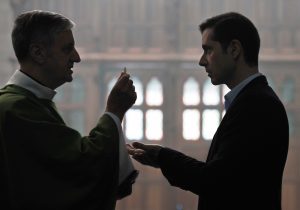 Sexual abuse survivor Alexandre Guérin (Melvil Poupaud, right) confronts his abuser, Fr. Bernard Preynat (Bernard Verley, left), in “By the Grace of God” (“Grâce à Dieu”). Photo courtesy of Music Box Films.[/caption]
Sexual abuse survivor Alexandre Guérin (Melvil Poupaud, right) confronts his abuser, Fr. Bernard Preynat (Bernard Verley, left), in “By the Grace of God” (“Grâce à Dieu”). Photo courtesy of Music Box Films.[/caption]
And then there was the difficulty involved in coping with side effects that grew out of the abuse. Some of those who contacted the support network through its hotline were noticeably shaken by their experiences, admitting to all manner of issues from emotional upset to suicide attempts. Among the principals in this story, Emmanuel was most affected, suffering from emotional fallout that caused him difficulty in developing and sustaining romantic relationships, as well as physical troubles including seizures and Peyronie’s disease. For most individuals, these conditions would be challenging enough to contend with in and of themselves, but, when added to the issues here, it made the lives of the affected that much more burdensome.
To add insult to injury, the victims also had to deal with the inadequate action of the church. Based on how the diocese handled Fr. Preynat’s indiscretions, coupled with statements by the Cardinal, it was apparent that the ministerial powers-that-be just didn’t get what was going on, unable to recognize the severity of the problem and unaware of what needed to be done. Fr. Preynat’s own pleas for help going unanswered by the church speaks volumes. But, even more egregiously, when the Cardinal observed that the church was “thankfully” spared even greater liability – a result of the tolling of the statute of limitations in many cases – by the grace of God, he was roundly criticized for his ignorance and indifference, something he explained away as a poor choice of words. Clearly he failed to recognize the gravity of the situation, believing his institution to be above such menial secular matters. Beliefs like that can truly get one in trouble.
Fortunately, the victims managed to successfully put all of the foregoing considerations aside, casting off their fears, taking back their personal power and invoking the courage needed to address the problems that had gone long unattended. They mustered up the fortitude to foster change that not only benefitted many of their own, but that also led to new protections to safeguard against potential future incidents. In conscious creation terms, that’s a prime example of living out one’s value fulfillment, the notion associated with being one’s best, truest self for the betterment of oneself and the world at large. And, if that’s not the grace of God (or the Universe or whatever term best suits you), I don’t know what is.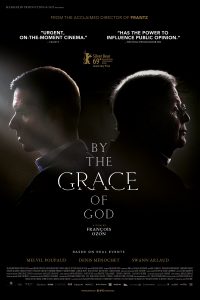
While the film sensitively deals with serious subject matter and becomes steadily more compelling as the narrative plays out, the story overall is sometimes a little too “tame” in addressing its material. What’s more, even though the picture aims to address the personal impact of this story on its principals more so than other such films have, it sometimes becomes bogged down by extraneous anecdotal material that adds little in the way of meaningful content, either in the individuals’ experiences or the larger scenario of which they’re a part. It’s easy to gets the impression that the film’s heart is in the right place but that it isn’t willing to go for the jugular more than it probably should have, perhaps a shortcoming of a French production taking on the French Catholic Church. Although the institution in question may wield considerable power, that doesn’t immunize it against justified scrutiny and criticism, no matter how much good work it may do. Director François Ozon’s offering gives a voice to those who traditionally have not had one, but it simultaneously misses the chance to sufficiently take on an organization that could have – and should have – done more than it did to keep an atrocity from getting out of hand.
“By the Grace of God” recently completed a limited theatrical run and is currently no longer in moviehouses. However, DVD and streaming releases are in the works, with details to follow.
Surviving ordeals like those suffered by the characters in this film may seem impossible at the time we’re going through them. However, by looking within to discover the reserves of strength that reside within us, we can begin the process of liberating this resource and putting it to use for ourselves and others like us. And the miracles its release can work are often truly astounding, bringing much-needed relief, justice and rectification. That’s quite a feat, but then there’s no telling what we can accomplish when we combine our considerable capabilities with those of the grace of God.
Copyright © 2019, by Brent Marchant. All rights reserved.
